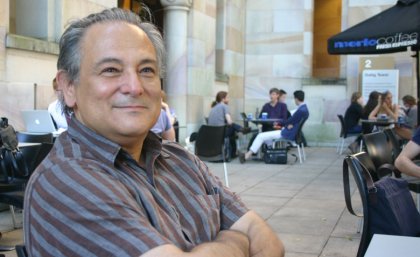
Imagine your partner goes for a quick swim while you sunbathe, but when they return you are unable to recognise them, despite them looking exactly the same as when they entered the water.
This tale from a patient encapsulates University of Queensland researcher Dr Alan Pegna’s ongoing fascination with the field of visual recognition.
Dr Pegna arrived at UQ’s School of Psychology from Switzerland a month ago, and is now launching into new research on neural processing and visual awareness.
“The condition where familiar faces are not recognised is called prosopagnosia,” Dr Pegna said.
“Some people are born with the condition and some develop it, either through a stroke or trauma to the brain.
“As many as one in five people may not be able to recognise a familiar face on initial visual stimulation alone.
“In the case of the lady whose husband went swimming and came back, she didn’t comprehend it was him – a man she saw nearly every day of her life – until he began to talk.”
After two decades of study in neuropsychology, Dr Pegna says the eyes and brain cannot be thought of as a computer that follows a sequential order in processing stimuli, as some believe.
Instead, he says he leans more towards the theory that visual processes can differ depending on the emotion produced by the stimulus.
“In the case of the woman on the beach, although she at first denies having ever seen her husband before, her blood pressure might rise and her pupils will dilate,” Dr Pegna said.
“Even more surprisingly, her body will respond differently when her husband’s face is presented to her on a computer screen.
“This indicates a lot of processing is going on in our brain without our awareness.”
Another research interest of Dr Pegna’s is how eyesight contributes to humans’ survival instinct, and how we recognise threats.
“Presented with a cluttered, complex picture containing many faces, peoples’ eyes are drawn to those considered angry or untrustworthy,” he said.
Dr Pegna has a Masters of Science and PhD in Psychology from the University of Geneva, as well as a Master of Science in Human Physiology from University College London.
Before his appointment at UQ, he was an Adjunct Professor at the University of Geneva and clinical neuropsychologist at Geneva University Hospital.
A combination of factors drew him to UQ, he said, including the university’s reputation, the presence of the Queensland Brain Institute and various attached psychology clinics, and the state’s weather and wildlife.
Media: Dr Alan Pegna a.pegna@uq.edu.au, +61 7 3365 4466; UQ Communications Robert Burgin r.burgin@uq.edu.au , +617 3346 3035, +61 0448 410 364.
.jpg)










